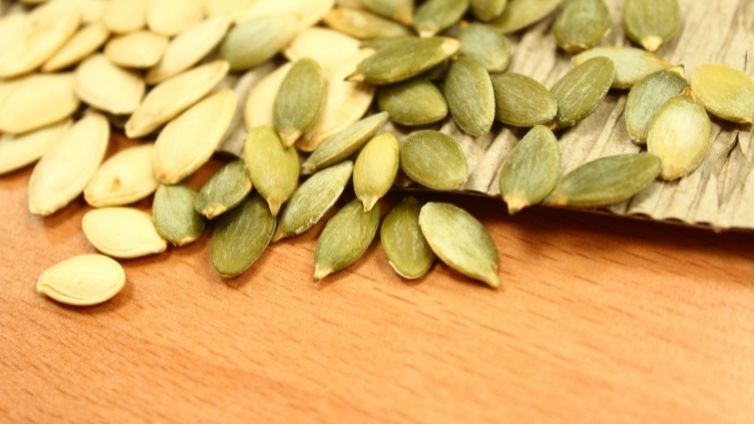When it comes to the human diet pumpkins and pumpkin seeds are a great addition to the human diet.
They are packed with many health benefits that people of different ages may benefit from.
Pumpkin and pumpkin seeds are packed with many health benefits and high nutritional values that can enhance human health.
These food items are packed with vitamins, minerals, and different antioxidants.
It’s no secret that dogs would try almost anything. They are big foodies and they are not scared to grab any food from the table and run as fast as they can.
The biggest downside is that they often won’t worry much if a certain food is healthy for them or not.
This is something that is best seen during the holiday season, such as Thanksgiving days when dogs are fast to grab meat, gravy, and everything in between.
Knowing what is safe for your Fido and what is harmful and what is safe can save your dog’s life.
Before you serve any for from your plate with your Fido, be 100% sure if that human food is healthy and safe for your dog.
You do not want to share onion and garlic with your dog, but you do want to share a fresh cucumber as a fresh summer treat.
But… Are pumpkin and pumpkin seeds something that your dog can also benefit from? Read on and discover.
Can Dogs Eat Pumpkin Seeds?
Simply said, yes – dogs can eat pumpkin seeds. When prepared right pumpkin seeds are safe to share with your dog.
Never feed your dog with raw pumpkin seeds and makes sure that you peel them.
All in all, pumpkin seeds are safe for dogs and can even be more beneficial than the pumpkin itself.
Shortlist Nutritional Facts On Pumpkin Seeds:
- Pumpkin seeds are edible
- Pumpkin seeds are packed with minerals
- Pumpkin seeds come with 126 calories
- Pumpkin seeds contain 1.7 grams of fiber
- Pumpkin seeds contain 7 grams of protein
- Pumpkin seeds come with 13 grams of fat
Now, let’s see what pumpkin seeds really are and how your dog can benefit from this food.
What Are Pumpkin Seeds?
Pumpkin seeds are found in the pumpkin and they are hard-shelled. When purchased at a grocery store pumpkin seeds are shell-free, oval, and flat making them easier to serve and consume.
Pumpkin seeds are packed with different minerals, various vitamins, and many antioxidants that are beneficial to overall health.
When it comes to choosing a great (and healthy) snack for your Fido, think about implementing pumpkin seeds into your dog’s diet.
Among dog owners, pumpkin seeds are often the first choice when it comes to healthy dog snacks.
If you check many recipes for homemade dog treats, you will see that pumpkin seeds are often seen.
Not only that this is something that dog owners do on their own, but veterinarians are the ones who recommend pumpkin seeds as a great ingredient for many treats.
Does this mean that dogs should eat pumpkin seeds regularly? Are pumpkin seeds really great for dogs? How can dogs benefit from these small items? Let’s discover.
Are Pumpkin Seeds Safe For Dogs To Eat?
All in all, there is nothing toxic in pumpkin seeds. Still, if a certain food isn’t toxic it doesn’t mean that it should be served in unlimited amounts or high quantities.
Even for people, too high an amount of pumpkin seeds can lead to some sort of stomach issues.
When it comes to overall health it is important to think about gut health.
Food that is rich in fiber is great for the stomach, but eating too often food that is packed with fibers can lead to diarrhea both in humans and dogs.
Occasional diarrhea in dogs can happen due to number of reasons, but in most cases, it will be food-related.
Certain food, like pumpkin seeds, usually doesn’t break down easily in the digestive system and can easily lead to discomfort and stomach upset.
That being said, be extremely careful when it comes to feeding your dog these small food items.
If your dog eats too many pumpkin seeds, you are most likely to contact your veterinarian.
Do not be surprised if your veterinarian advises you to induce vomiting to avoid further problems.
How to Feed Your Dog Pumpkin Seeds
Pumpkin seeds are often served as a treat. Commonly, dog owners choose to grind them into a powder mix and mix it with dry or wet dog food.
You can also cook them and serve cooked as a daily treat. Dogs love rewards and if rewards come in a form of delicious snacks they will adore performing every command, task, and training session.
All in all, it all comes down to your dog’s preferences. Should you serve any kind of pumpkin seeds to your dog? Well, no.
You really need to be extra careful when it comes to feeding your dog with pumpkin seeds purchased in any store.
In grocery stores, pumpkin seeds are usually packed with salt, seasoning, or any other artificial flavor that can harm your dog’s health.
Another way to serve pumpkin seeds to your dog is to roast them whole and offer as such to your dog.
What to Watch For:
Again, we cannot stress enough just how important it is to serve treats to your dog in moderation.
Serve seeds to your dog in moderation, because the fat content may lead to soft stool or diarrhea. Once you roast the seeds never salt them.
Dogs and salt do not mix well, and you don’t want your dog to experience sodium shock.
How Much Pumpkin Seeds To Give Your Dog?
Serving pumpkin seeds to your dog in moderation is the best way to keep your dog’s diet richer enough, and his health in balance. However, serving something in moderation isn’t the same for every dog.
Still, the general guidelines should be enough to keep your dog safe. Serve a quarter teaspoon per ten pounds of body weight per day.
However, this doesn’t have to be a strict rule, because pumpkin seeds should be an occasional treat, not an everyday occurrence.
This way you will keep the dog’s diet more appealing and fun.
Are Pumpkin Seeds Good For Dogs?
In general, pumpkin is safe for dogs.
Since pumpkin is packed with many health benefits for both humans and dogs, there are actually no hard reasons why you should serve pumpkin seeds to your dog.
Pumpkin seeds are packed with amino acids that can help eliminate parasites from your dog’s digestive tract. That’s right, certain food can help keep those nasty parasites away.
This doesn’t mean that you should serve a huge amount of pumpkin seeds to your dog, but you should serve them in moderation.
What can you expect in terms of health once you start serving your dog pumpkin seeds?
You can expect your dog to get a fair amount of ‘good fat’ which can result in lower bad cholesterol levels.
On the other hand, a pumpkin is a great option if your dog is troubled with constipation.
Even if your dog has an upset stomach, you can offer him a bit of pumpkin to ease this disturbance.
Pumpkin is rich in antioxidants and vitamins, which is why it can also help with the aging process and keep eyesight strong.
Now, let’s learn more about pumpkin in a dog’s diet.
The Health Benefits Of Pumpkin For Dogs

Pumpkin is great. Not only is packed with many healthy nutrients, but it is also easy to digest and mix with dry and wet food, as long as you prepare it the proper way.
Pumpkin is considered to be a superfood because it is very low in calories but also offers a significant amount of fiber.
Next to this, pumpkin is low in sodium (which is safe for dogs), and high in beta-carotene, potassium, and vitamin C.
Next to these features, pumpkin seeds are packed with a wide variety of antioxidants and phytonutrients.
As such, pumpkin seeds are a great source of potassium, magnesium, and calcium.
These popular seeds are also a great source of healthy oils and polyunsaturated fatty acids (PUFAs).
Natural Remedy For Worms And Parasites
So far it’s clear that pumpkin seeds are safe for your dog to consume as long as you prepare them the right way.
Yet, probably the biggest benefits of pumpkin seeds lie in their ability to help dogs fight of worms and parasites.
Every responsible dog owner knows that prevention is the key when it comes to having a healthy and strong dog.
This is why regular parasite control is so important.
Now, you may wonder how these tiny food items can help dogs fight off worms and parasites, right?
Well, the secret is in the amino acid cucurbitacin which is found in pumpkin seeds that can paralyze and eliminate parasites from your dog’s digestive tract.
Add properly prepared pumpkin seeds to your dog’s food occasionally to help them keep strong digestive health.
If you are not sure how your dog might react to pumpkin seeds, start small. If you notice any unusual reaction talk with your veterinarian.
Dog fanciers will often tell you that pumpkin seeds can entirely replace veterinary dewormers, but before you decide to go all-in on pumping seeds, make sure that you talk with your veterinarian first.
Many will argue the claim that pumpkin seeds can kill intestinal worms. These worms especially tapeworms are easily picked up from other animals and different environments and can appear over and over again.
This is why it is important to talk with your veterinarian. So far, it’s known 100% that the right diagnosis will lead to the right treatment and keep your dog safe.
All in all, the best medicine is to keep your dog on a preventative medication that can keep off these pesky parasites.
Are There Any Pumpkin Seed Disadvantages?
As mentioned earlier, you should serve them well-prepared and in moderation.
If you let your Fido eat too many pumpkin seeds may experience diarrhea, since these seeds are high in a high-fat content.
If possible, serve your Fido organic seeds. In general organic seeds should be free from pesticides and preservatives.
For safest serving serve pumpkin seeds roasted, as they will last longer and will be easier to powder into food.
How To Store Pumpkin Seeds
As mentioned earlier, the best way to serve pumping seeds to your dog is to serve them roasted.
Once you roast them you can serve them the following day, or a few days later – you don’t have to serve them all immediately.
Storing the food the right way is important or you can expect it to be spoiled.
Pumpkin seeds can easily spoil if you do not store them the right way. Once you roast them, let them completely dry, and then place them in an airtight container.
Prepared in such a manner, pumpkin seeds can last up to a week on the shelf, or up to 60 days (or two months) if you choose to store them in the refrigerator.
If you place them in an airtight container and freeze them in the freezer, they can be useful for up to six months.
Take the storage process seriously, and make sure that every jar or airtight container is properly closed.
If you miss sealing containers properly the food inside can spoil and become toxic.
On the other hand, when you store them the right way they can remain fresh for months.
The Bottom Line
Before you serve any human foods to your dog, make sure that that specific food item is safe for your dog.
What may be great and beneficial for you, might be harmful to your dog, and you don’t want to create additional complications related to your dog’s health?
If you choose to include pumpkin seeds in your dog’s diet, do it gradually. Start small, and monitor him closely for his reaction.
If he experiences any nausea, diarrhea, or any other disturbance it should be an indicator that pumpkin seeds shouldn’t be in your dog’s diet.
On the other hand, if everything goes well and your dog shows strong interest in pumpkin seeds, keep on serving them (your best option is to serve them roasted to your dog) as an occasional treat.





















